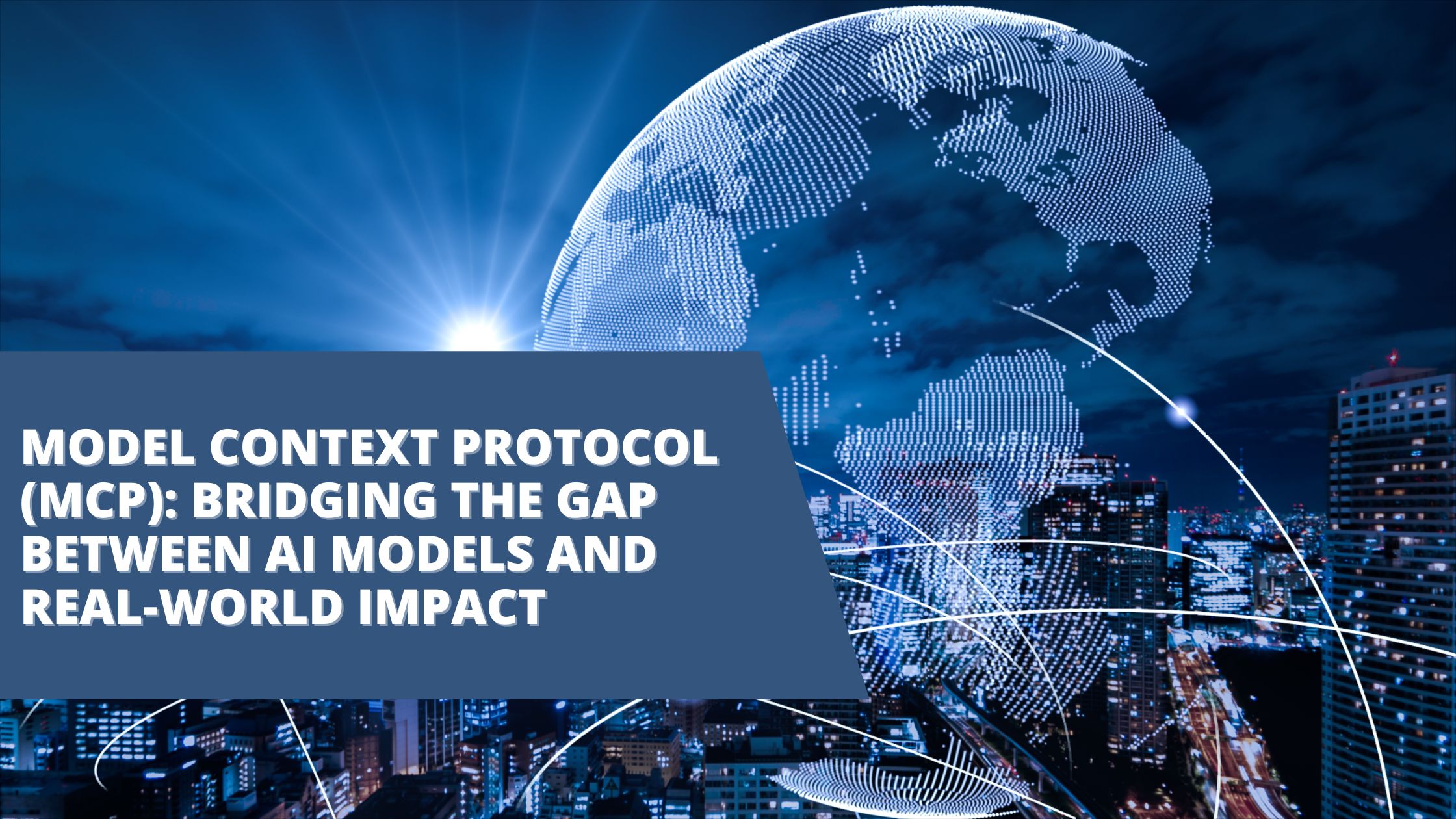Model Context Protocol (MCP): Bridging the Gap Between AI Models and Real-World Impact
Artificial Intelligence is no longer just a futuristic concept; it’s shaping our present in profound ways. From enhancing customer experiences to optimizing complex systems, AI models play a crucial role in various sectors. However, these models often struggle to connect with real-world applications effectively. This disconnect can lead to missed opportunities and unintended consequences. Enter the Model Context Protocol (MCP)—a groundbreaking framework designed to bridge that gap. By ensuring that AI models align closely with their intended contexts, MCP promises not only better performance but also greater societal impact. As we explore this innovative protocol, we’ll uncover how it works and what makes its applications so vital for today’s challenges. Ready to dive into the world of MCP? Let’s go!
The Importance of AI Models in Today’s World
AI models are transforming industries at an unprecedented pace. They analyze vast amounts of data to provide insights that were once unimaginable. From healthcare diagnostics to financial forecasting, these models enhance decision-making and efficiency.
In businesses, they streamline operations by predicting customer behavior and optimizing supply chains. This not only cuts costs but also elevates user experiences significantly.
Moreover, AI models drive innovation in research and development. They empower scientists to simulate complex scenarios, accelerating breakthroughs in fields like climate science and drug discovery.
As society grapples with challenges such as resource allocation and urban planning, the importance of accurate AI modeling becomes even clearer. These tools have the potential to solve some of our most pressing issues while paving the way for a more sustainable future.
Limitations of Current AI Models
Current AI models, while groundbreaking, face several limitations that hinder their effectiveness. A primary concern is the lack of contextual understanding. These models often struggle to grasp nuances that a human would easily interpret.
Data dependency poses another challenge. Most AI systems rely on vast amounts of data for training. If this data is biased or incomplete, the model’s performance can suffer significantly.
Moreover, many models operate as black boxes, making it difficult to understand how decisions are made. This opacity raises concerns in critical areas like healthcare and law enforcement.
Scalability issues also arise when deploying these technologies across diverse applications and environments. Adapting one size fits all approaches rarely works well in practice; each situation requires tailored solutions.
Ethical considerations remain paramount as we navigate privacy and security concerns surrounding sensitive information utilized by AI systems. Solutions must evolve alongside technology to address these ongoing challenges effectively.
Introducing the Model Context Protocol (MCP)
The Model Context Protocol (MCP) represents a pivotal shift in how we interact with artificial intelligence. It establishes a framework that integrates AI models more seamlessly into real-world applications.
At its core, MCP focuses on contextualizing data and model outputs. This ensures that AI isn’t just spitting out results but doing so with an understanding of the environment it operates within.
By encapsulating the nuances of different contexts, MCP enhances the relevance and applicability of AI solutions. It empowers developers to tailor their models based on specific needs while acknowledging constraints present in various scenarios.
This adaptability can significantly improve decision-making processes across industries, making interactions with technology feel more intuitive and less robotic. The potential for growth is vast as organizations begin to recognize how vital context is in leveraging AI effectively.
How MCP Works and Its Benefits
The Model Context Protocol (MCP) streamlines the integration of AI models with real-world scenarios. By establishing a standardized framework, MCP ensures that models can adapt to various contexts seamlessly.
One key benefit is its ability to enhance model performance. When contextual information is applied, AI systems become more accurate and relevant. This leads to better decision-making in complex environments.
Another advantage lies in improved collaboration across different sectors. With a unified approach, stakeholders from diverse industries can share insights and experiences more effectively.
MCP also fosters transparency. By clarifying how models interpret context, users gain trust in AI outcomes. This openness encourages broader acceptance of AI technologies.
The protocol facilitates continuous learning for models. As new data emerges, MCP helps update existing frameworks without starting from scratch—a crucial aspect for staying ahead in an ever-changing landscape.
Real-World Applications of MCP
The Model Context Protocol (MCP) is revolutionizing various industries by enhancing the way AI models interact with their environments. In healthcare, it streamlines patient data analysis, allowing for quicker diagnosis and personalized treatment plans.
In finance, MCP improves risk assessment algorithms. This ensures that decisions are based on real-time market conditions rather than outdated models.
Retail also benefits significantly from this protocol. Businesses can now analyze consumer behavior more accurately, leading to optimized inventory management and targeted marketing strategies.
Moreover, environmental science uses MCP to model climate change scenarios effectively. Accurate predictions lead to better policy-making and resource allocation.
By bridging gaps between raw data and actionable insights, the applications of MCP extend across sectors like education and transportation as well. Enhanced decision-making processes pave the way for innovation in these fields.
Addressing Ethical Concerns with MCP
Ethical concerns in AI are paramount as technology evolves. The Model Context Protocol (MCP) steps up to address these issues head-on. By providing a structured framework, MCP ensures transparency and accountability in AI model deployment.
Understanding the context of an AI’s decision-making process is crucial. MCP clarifies how data inputs influence outcomes, allowing stakeholders to scrutinize decisions more effectively. This clarity promotes trust among users and developers alike.
Moreover, ethical guidelines embedded within MCP can help mitigate biases inherent in training data. Ensuring diverse representation during model development becomes essential for fair outcomes across various demographics.
By integrating ethical considerations into its core functionality, MCP fosters a culture of responsibility among AI practitioners. As organizations adopt this protocol, they not only enhance their models but also contribute positively to societal norms surrounding artificial intelligence.
Future Implications of MCP in the Field of AI
The Model Context Protocol (MCP) is poised to revolutionize how AI interacts with diverse environments. As it grows in adoption, we can expect more adaptable models that seamlessly adjust their behavior based on context. This adaptability opens doors for innovative applications across various sectors.
Healthcare is one area where MCP could transform patient care. By tailoring AI responses to individual medical histories and conditions, treatment plans could become more personalized and effective. Financial services may also benefit greatly by using context-aware algorithms to assess risk dynamically.
Education stands to gain from MCP as well. Personalized learning experiences will help students progress at their own pace, enhancing engagement and comprehension.
As technology advances, the ethical implications of these intelligent systems warrant careful attention. Ensuring transparency in how decisions are made will be crucial for maintaining public trust in AI-driven solutions moving forward.
Conclusion
AI models have become pivotal in shaping our modern world. They drive innovation, enhance productivity, and provide solutions to complex problems. However, their limitations can hinder their effectiveness in real-world applications.
The Model Context Protocol (MCP) emerges as a solution to bridge the gap between AI capabilities and practical use cases. By providing context-aware frameworks, MCP enables AI systems to adapt more effectively to various scenarios, ensuring they deliver relevant and impactful results.
How does MCP achieve this? It emphasizes understanding the nuances of different environments where AI operates. This adaptability opens doors for significant benefits across industries—from healthcare to finance—enabling tailored responses that align with specific needs.
Real-world applications of MCP are already being explored extensively. From improving decision-making processes in business operations to enhancing patient care in medical settings, the possibilities are vast and exciting.
Ethical concerns surrounding AI do not disappear with MCP; rather, it offers a pathway toward addressing them responsibly. By fostering transparency and accountability within models using this protocol, stakeholders can ensure ethical considerations remain at the forefront of technological advancements.
Looking ahead, the future implications of the Model Context Protocol hold promise for transformative changes across sectors. As organizations increasingly adopt this framework, we may witness enhanced collaboration between humans and machines that prioritizes efficiency while respecting ethical boundaries.
Embracing innovations like MCP is essential as we navigate an ever-evolving landscape driven by artificial intelligence technology.



